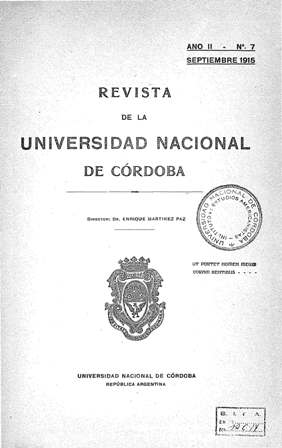Origin and evolution of "Jus Gentium" in Rome
Keywords:
Jus Gentium, RomeAbstract
Jus Gentium, when it laid its foundations and developed in Rome, produced the universalization of chirurgical law, following and adhering to the same degrees of evolution as the former. It was a double perfection of the law of the city, which operated jointly and harmoniously, suffering the thrust of causes, in part, similar and, in part, diverse. Let us investigate, then, in what form the Jus Gentium arose and developed in Rome.
References
Sales y Ferre, «Sociología>, primera parte, págs. 19 a 29 (Madrid. 1889).
Laserna, «Paolegómenos del derecho, págs. 54 y siguientes.
De la Pisa Pajares, «Prolegómenos del derecho:>, págs. 158 a 185.
La Serna, «Proleg6menos del derecho», pág. 55.
Díez de Medina, <
Weiss-Zeballos, «Derecho internacional Privado», pág. 71.
«Derecho Natural», pág. 669.
«Derecho de Gentes», t. I, pág. 3.
«Derecho Internacional Privado», t. I, pág. 1.
Omnis definitio in jure civiii periculosa est; parum est enim, ut mon subverte possit. «Epístolas», libro XI, D., L. 50, t. XVII, párrafo 202.
Comentarios al edicto provincial», libro V, Dig., L. IV, t. XVII pág 122 (164).
Fustel de Coulanges, «La ciudad antigua», págs. 190, 206 y 262.
«Comentarios a Sabino», libro XXVIII. D., L. 50, título XVII pág. 22.
Fustel de Coulanges, «La ciudad antigua», pág. 265.
Vattel, «Derecho de gentes, t. I, pags. 91 y siguientes.
Weiss-Zeballos, «Derecho Intemacional Privado», t. I, pago 80 a 91 (Nota).
Du Boys, .«Historia del Derecho Criminal», t. I, pág. 217.
Tito Livio, ob. cit. t. II, pág. 12 de Chassat, «Traite des Statuts», págs. 150, 151 y 152. (Edición de 1845).
Fiore, «Derecho Internacional Privado», t. I, página 54 y subsiguientes.
E. S. Zeballos, «Justicia Internacional Positiva, pág. 142 y siguientes.
Foelix, «Derecho Internacional Privado», t. I, 5.
Arhens, «Enciclopedia Jurídica»; t. II, pág. 80.
Laurent, «Historia de la humanidad, t. III, pág. 308.
Downloads
Published
Issue
Section
License
Copyright (c) 1915 Universidad Nacional de Córdoba

This work is licensed under a Creative Commons Attribution-NonCommercial-ShareAlike 4.0 International License.
Commercial use of the original work and any derivative works is not permitted, and distribution of derivative works must be made under a license equal to that which governs the original work.






